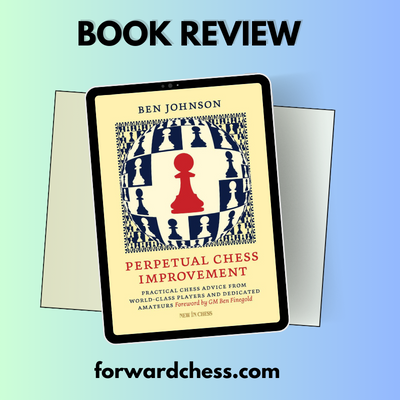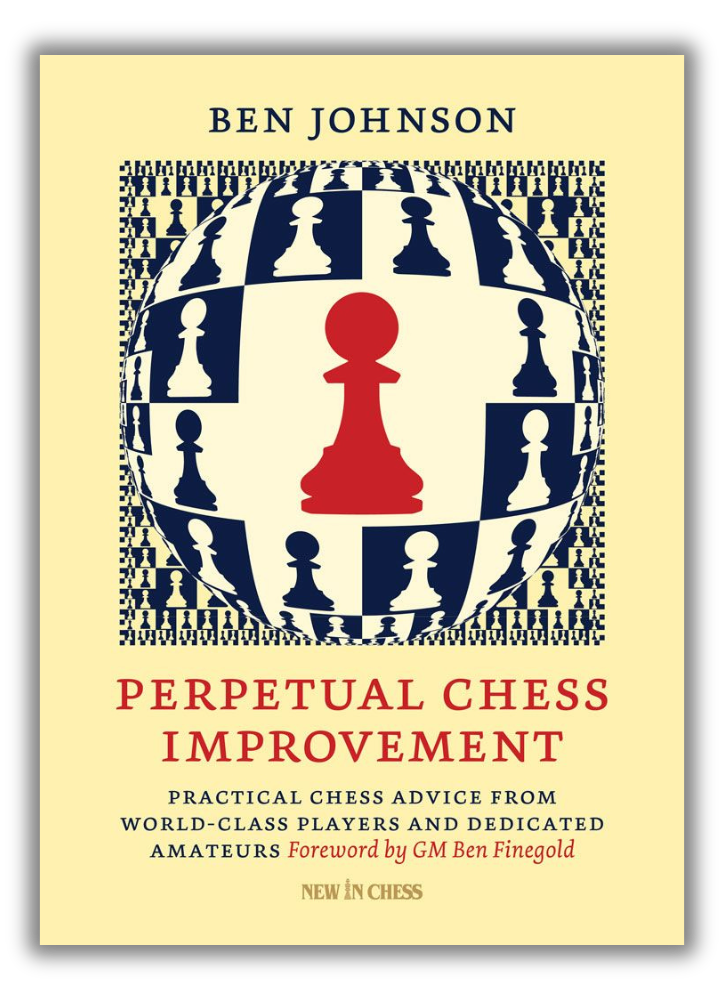“My wife, kids, and dog don’t care what my rating is, but it helps my mental health to have a hobby that I love and that I know I will enjoy playing into my fast-approaching golden years.”
– Ben Johnson, Author, Perpetual Chess Improvement.
Perpetual Chess Podcast lists 381 episodes as of May 2024. According to the host and author of the book, Ben Johnson, the podcast started out interviewing “titled players, authors and content creators”. This changed in 2017 when he expanded the interviews to include adult improvers, which eventually became the most popular segment of the podcast. This series is the primary focus of the book.
Johnson noted that he had a huge amount of material to base his book on, and of course, it’s expected that there will be different views on how amateurs can improve their game.
He states:
“…my guests don’t always agree on best practice methods. NM Vinesh Ravuri reached 2200 while barely studying openings. On the other hand, acclaimed author and IM Willy Hendriks argues convincingly that studying openings is actually underrated for club players!”

The book is split into five parts, and Johnson describes the first four parts as follows:
“Part I covers what I call the ‘four pillars of chess improvement’.
They are:
1) playing serious games, 2) reviewing them, 3) doing tactics, and 4) finding a community.

In Part II, I wade into murkier waters and discuss the many other ways you can spend your chess study time. Topics include working on visualization, different philosophies about studying openings, the pros and cons of playing speed chess, and more.

Part III is devoted to how to approach the game away from the board. In that section, we discuss goal-setting, principles of deliberate practice, tournament routines, and some of those pesky healthy habits that are hard to maintain. Part IV gives you a quick tour of the major tools for chess improvement. You might be familiar with some of them, but I hope there are some fun stories and helpful recommendations in that section.”
The final part covers some aspects of chess and life.

Hence, the coverage of the book is quite broad. However, given that the book is a distillation of the views of different players, it is perhaps inevitable that there are conflicting views on various areas as noted in the quote above. This doesn’t detract from the teaching aspects of the book, but it’s an acknowledgement that there are many ways to improve, and readers can choose those that resonate with them.

A key recommendation of the book is to study your own games, and the book provides many suggestions in this area. Johnson states that this should be an active process to establish areas that need improvement. Of course, there is some good discussion in how to use chess engines, and the software tools and chess sites that offer analysis options, and how to work with a chess coach. Other interesting and useful features of the book include information on board visualization, checklists, rest and fitness, and support from family and friends.
The book covers all areas of the game with good balance, although the crucial role of endgame skills is noted, despite amateurs been often too keen to study the latest opening wrinkles instead of fundamental endgames. Some guidelines for getting the most out of the vast chess literature, and suggested books that are geared at a player’s appropriate level are also included.
The importance of looking for similar patterns from previous games is emphasized. Johson quotes Alexi Shirov about his famous game against Veselin Topalov in Linares 1998, where he played the famous sacrifice 47…Bh3!!.
According to Shirov, as quoted in the book:
“I believe that real creativity comes when you master the ability to connect different parts of your experience and perception, sometimes even small chaotic pieces of it, which at first sight don’t seem to be directly related… It is sometimes necessary to expand the dimensions of your brain-work from logic to the ‘associative level’ … [During the Topalov game] the position against Ulf Andersson suddenly came into mind.”
Here, Shirov is referring to his game against Andersson in Biel 1991.
Two examples from the book are given below, with annotations from the book.
example 1 –
example 2 –
In conclusion, I think most players can relate to the author’s attitude in the opening quote above. We may not become titled players, let alone super-grandmasters, but that doesn’t stop us from playing, learning, improving, and enjoying the game for a lifetime. Johnson’s love of chess shines throughout the book and it complements the more didactic aspects of the book. The result is a book that can be studied and enjoyed by a wide range of players.
- 1000 Published books on Forward Chess - November 15, 2024
- Book Review: A Guide To Chess Improvement - September 9, 2024
- Review: Chess Coach by Vladimir Barsky - August 26, 2024



